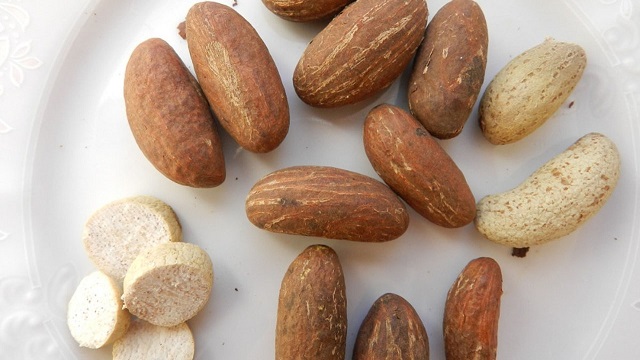Garcinia kola, often known as Bitter kola or male cola, is a flowering plant found mostly in the tropical rainforest region of Central and West Africa.
Bitter cola is used in traditional African medicine for the treatment of various infectious diseases, such as hepatitis, infections due to the influenza virus, and other viral diseases.
The early blends of Coca-Cola contained the plant, explaining the similar name, while the current formula of the world-famous drink is no longer flavored with actual bitter kola.
In terms of taste, the plant is well named! The edible seeds have a notably bitter taste, while there is also a slight sweetness to them.
Some of the health benefits of bitter cola are;
- The aphrodisiac credentials
Traditional medicine considers bitter kola to be an aphrodisiac, so it’s believed to increase sexual desire, pleasure, and performance. With these qualities in mind, why not try some bitter kola to help turbo-charge your sex life!
- The nuts may be a remedy for osteoarthritis
With symptoms ranging from uncomfortable to debilitating, osteoarthritis is a common form of arthritis. It’s characterised by the degeneration of joint cartilage and the underlying bone, causing pain and stiffness, especially in the hip, knee, and thumb joints. The causes of osteoarthritis can include joint injury, obesity, aging as well as hereditary factors.
READ ALSO: 8 health benefits of African star apple
- Bitter kola has antibacterial qualities
A study published in the Science Journal of Microbiology has shown that both the bitter kola seeds and leaves have antibacterial properties. Bitter kola was tested against Staphylococcus aureus, Streptococcus Pyogenes, Salmonella typhi, and Escherichia coli, and the plant was able to inhibit these microorganisms. The antibacterial activity was found to be due to the presence of bioactive components in the extract such as tannin, and saponins.
- The nuts may improve the function of the lungs
Results from research conducted in conjunction with several Nigerian universities showed that bitter kola has a positive effect on the lungs and can improve ventilation levels. Extracts of the plant have also been studied in relation to asthma, and there is the suggestion that bitter kola may have some protective effects against respiratory disorder.
- Bitter kola nut may improve the immune system
Bitter kola has a high concentration of antioxidants, which is a term for any compound that counteracts free radicals. While environmental stressors such as tobacco smoke, ultraviolet rays, and air pollution cause free radical production, they are also produced by many normal processes in the body including exercise and our immune response. Free radicals damage DNA, cell membranes, and other parts of cells. So, as well as being essential assistance for important functions in the body, antioxidants also support the immune system. With a strong immune system, we are better able to fight disease and stay healthy.
- It may be an antimalarial agent
Bitter kola contains the antioxidant kolaviron, which according to research published in the Asian Pacific Journal of Tropical Medicine, shows positive results for antimalarial properties. Traditional healers have for many years prescribed bitter kola for the treatment of malaria infections, and now, scientific studies are starting to support their beliefs.
- Bitter kola may help to fight glaucoma
Glaucoma is a condition of increased pressure within the eyeball, causing a gradual loss of sight, and can result in permanent blindness if left untreated. A study in the Middle East African Journal of Ophthalmology showed that bitter kola is useful for reducing the pressure in the eye for newly diagnosed patients, and was as effective as more conventional treatments. It is important to note that you must follow professional medical advice and treatment if you have glaucoma, even if the condition is newly diagnosed.





